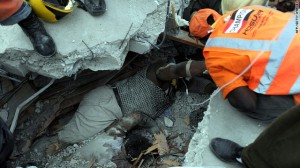Update June 4 10:00 am: The BP robot operators are trying to close the valves on the gusher cap they installed last night. Meanwhile, oil blasts out through those valves while some channels up to a surface ship. It remains to be seen if by closing the valves BP can stop the uncontrolled gusher and channel all of the oil to their ships.
Update June 3 10:00 pm: It does not appear to be working. I think BP keeps insisting on using rather narrow pipes to handle this gusher which is putting out enormous loads of pressure. Why don’t they fit a large sewer pipe around this blowout preventer? A large diameter sewer pipe could simply hang around the gusher without even making a tight fit. Then the gushing oil would be gradually corralled into a somewhat narrower pipe leading to the surface. Blockages of frozen matter seen in the original effort to put a big box around the gusher must be a product primarily of using too narrow gauge a pipe for this job. You can’t try to push all this high-pressure oil into a narrow pipe leading to the surface. You have to gradually ease it up into a very wide pipe.
The cap BP is trying to fit on the gusher simply doesn’t have enough weight to press its rubber gasket tight enough to the pipe, so too much oil is leaking around it. BP’s robot operators are wonderful, but I’m having very serious doubts about the competence of its engineers. Very serious. It may be well past time for President Obama to get NASA involved. There’s no way that a good engineer is going to be trying to fit a narrow pipe over a high-pressure volcano. It’s silly.
By the way, this planetary level disaster is quite likely to wipe out most of the coast of the United States. The greatest superpower nation on earth is about to lose most of its coastline from the south all the way up the eastern seaboard to New York. A single company with a single 24-inch hole in the ground has done this. It is this event, not 9/11, that is the turning point. We have reached the end of the era of global corporations. They are too dangerous. Governments must retool and rethink. Companies like BP must be destroyed, either financially or legislatively.
Original post below:
If you want a few heroes out of this horrendous Gulf Oil Disaster, you should start by watching the work of whoever is controlling the deep water submersible arms. It’s fascinating and highly educational to observe the careful thought process that goes on in advance of every single minute movement made by this machine. Remote control at 5000 feet of depth is a rare skill indeed. BP is attempting to place a cap and pipe onto the cutoff top end of the pipe that is spewing oil into the Gulf waters. So the robots will need to be carefully controlled to aim this device and place it right into the center of the gusher.
This approach has a high probability of success. But if they miss the hole and bend something, they will need to try again. This could well be one of the great feats of engineering in modern times. Well worth watching patiently.

